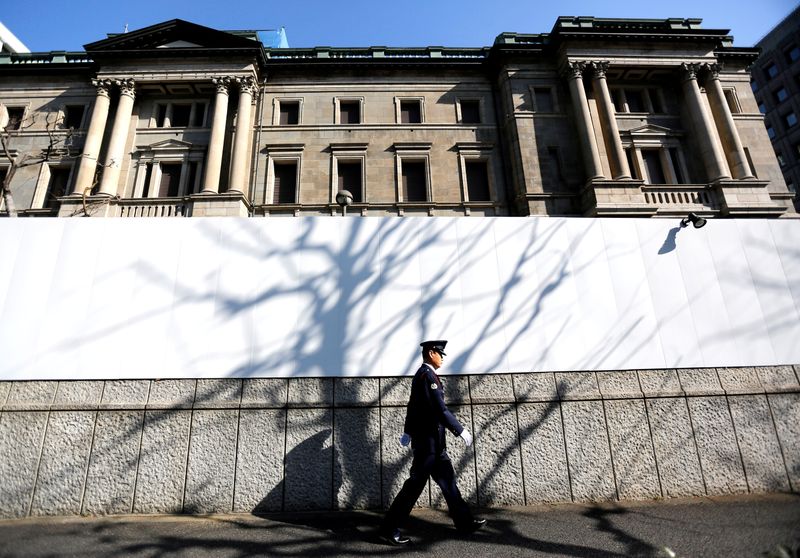TOKYO (Reuters) – Shares in the Bank of Japan (BOJ) hit their upper trading limit for a third session on Wednesday, in the latest example of how excess liquidity can draw retail investors toward seemingly irrational trades.
Shares in the BOJ, one of a handful of central banks with listed stock, surged more than 17% to 47,000 yen ($439.80) to reach their highest levels since May 2018.
So far this week, the central bank’s shares have surged by 68%, which is on par with volatile cryptocurrencies and select meme stocks chased up by U.S. retail investors.
The price spiral has left professional stock analysts scratching their heads, because they say there are no fundamental reasons to justify the move.
The Japanese government owns 55% of the BOJ’s outstanding shares, which are traded on the JASDAQ bourse for small firms. The BOJ’s objective is not to make profits, its shares have no voting rights, pay restricted dividends and volumes are extremely low because they cannot be traded electronically.
“The move in BOJ shares is just based on speculation. It’s moving exactly the same as bitcoin,” said Koichi Kurose, chief strategist at Resona Asset Management.
“This means investors with abundant cash are hunting out for anything new to invest, based on the day’s topical theme. They are buying BOJ shares because of the recent market boost.”
A BOJ spokesman declined to comment on the share price moves.
The rally in BOJ shares comes just a few weeks before the central bank conducts a review of its monetary policy.
The central bank is widely expected to scale back on its purchases of exchange-traded funds (ETFs), which some critics say have distorted prices in the stock market.
Japanese social media was abuzz with posts about Governor Haruhiko Kuroda’s revelation in January that the BOJ’s ETF holdings were likely reaping unrealised profits of around 12-13 trillion yen due to a massive rally in Tokyo stocks.
Japanese shares have risen to heights not seen since the asset bubble economy of the late 1980s, with the Nikkei index reclaiming the 30,000-mark last month on expectations for a quick economic rebound from the coronavirus pandemic.
A stock analyst suggested some investors might be buying BOJ shares for the physical stock certificate as a memento of the 2020s era of easy central bank money and soaring equities.
The analyst, who declined to be named, said the current surge reminded him of when retail speculation pushed the BOJ’s stock to a record high of 755,000 yen in 1988, and that sentiment now is as bubbly as it was decades ago.
“BOJ shares might have surged on its upbeat earnings but the bank’s business objective is not to post profits, its purpose is to stabilise BOJ notes,” Hiroyuki Kubota, a financial analyst, tweeted.
“We have to be cautious that BOJ shares are attracting speculative money,” Kubota added.
Resona’s Kurose warned that a fall in BOJ shares could portend a market downturn.
“After all BOJ shares have no substance in them. Shareholders do not have rights to seek higher returns,” he said.
($1 = 106.8700 yen)
(Reporting by Junko Fujita; Editing by Vidya Ranganathan and Jacqueline Wong)



















